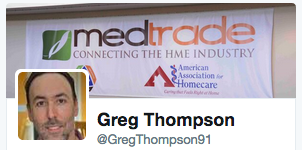PHOENIX – If you’re looking to improve workflow processes and procedures such as intake and scheduling, you should consider the hour-and-45-minute panel discussion at Medtrade West. Unlike previous years, the Expo Hall and Conference portions of Medtrade West are completely separate with no time conflicts. July 12 and 13 will feature educational sessions and workshops, and July 14 will be entirely devoted to the Expo Floor from 10:00 a.m. – 4:00 p.m.
Creating Excellence in Your HME Front Office Processes & Procedures will take place on July 12, from 1:00 – 2:45, with five expert panelists. Topics covered during the session include: intake, evaluating current tracking processes; insurance verification; prior authorizations; scheduling; order fulfillment; staff and staffing ratios; and patient and referral management.
Medtrade Monday sat down with panelist Joey Graham, executive vice president and general manager, Prochant, Charlotte, N.C. to get a preview of what attendees can expect in Phoenix.
 Medtrade Monday: What is the most common front office process that goes awry?
Medtrade Monday: What is the most common front office process that goes awry?
Graham: Intake specifically—which, when you look at the value chain in the front office, intake is that critical step where somebody has to create a clean billable order and get it sent out for delivery, and then it continues through the process. When you go back into the back office, almost every single problem originates in intake. It goes awry because it’s an extremely stressful position. If owners are out there and they haven’t done it themselves in a while, they really should. They should sit in that seat for a day and understand the stress. As a result, it’s high turnover. A lot of providers treat it as an entry-level position, and so there’s just that churn. You’re constantly training new people, and it’s inexperienced younger people doing the process. They don’t like it, they’re stressed out, and they do a poor job. As a result, providers have all kinds of downstream issues.
Medtrade Monday: What are some of the downstream issues?
Graham: The biggest one is of course going to be the holdup to their revenue. That’s going to happen because of a couple things. One thing could be that the claim never bills in the first place. Instead, it gets caught up in the hold, and then it becomes somebody else’s problem, and there’s a lot of chasing that happens there; chasing down documentation, chasing down prior authorizations. The order bills and turns into just a denial, and that’s a whole other set of issues. Again, it’s somebody else’s problem and there’s a lot more chasing again to get the documentation we need for the appeal, or correct the data issue and get the claim re-submitted. Either way, we just added weeks to our DSO on that claim.
Medtrade Monday: What advantages can be had by outsourcing billing processes?
Graham: Any time somebody is going for a new product or service like ours, they’re either trying to get away from pain or they’re trying to get toward some sort of positive state. It’s all about that emotional decision. Outsourcing is the solution to this pain. The first issue is staffing pain. When I say staffing pain I mean high turnover, training, hiring, retaining, managing teams, having call centers, things like that. It’s a tremendous amount of distraction for providers to have these large teams.
Almost every provider we talk to is struggling with staffing. Nowadays there are so many virtual job opportunities out there that a lot of employees are jumping ship. Employers are really struggling to get those people trained and keep those people happy. Outsourcing makes it our problem. Now it’s on us to get the people in the seats, to make sure they’re trained, to manage that team to excellence. And from the provider’ perspective, they don’t have to worry about that.
The second thing is labor costs. Right now, labor costs are high and they’re going up. There’s talk of a 15 dollar an hour minimum wage. All these things are driving providers to look for areas to save some costs. When you look at their balance sheet, the number one expense is labor by far. So finding areas where you can make some savings on your labor expense can be a big deal. Another reason providers would turn to an outsourcing company is to help them maximize their collections and help them achieve industry leading KPIs (key performance indicators).

Medtrade Monday: Is there a misconception about outsourcing billing processes?
Graham: Providers will sometimes think that outsourcing is all or nothing, but that’s not the case. They have the ability to outsource strategically. I think a lot of providers don’t explore outsourcing more because they sort of feel like it’s this all or nothing proposition. I’ve got to turn over all my billing and collections to this company, and that’s not necessarily the case. Especially working with someone like us, they have the ability to do more of an ala-carte approach and plug in resources where they need them, outsourcing a portion of their billing, a portion of their collections, or what makes sense to them. It’s worth exploring even if you have an amazing in-house team, because the outsourcing partner can supplement them and give you even better results.
Medtrade Monday: What is your mindset going into your first tradeshow after the pandemic?
Graham: Medtrade Spring 2020 was my last tradeshow. I was in Vegas, so it’s been a long time coming. I can’t wait to get out. I don’t want to speak for all vendors, but everyone I’ve spoken with has really struggled with the shift to virtual. There hasn’t been a lot of value to the vendors and the sponsors in this environment unfortunately. I know we all can’t wait to get back out and rub shoulders with providers, understand where they’re at, how things have changed, how things have not changed. We’re looking forward to having some good conversations, and I think we’re all thirsty for in-person interaction again.
Creating Excellence in Your HME Front Office Processes & Procedures will take place on July 12, from 1:00 – 2:45, with five expert panelists. Topics covered during the session include: intake, evaluating current tracking processes; insurance verification; prior authorizations; scheduling; order fulfillment; staff and staffing ratios; and patient and referral management.


